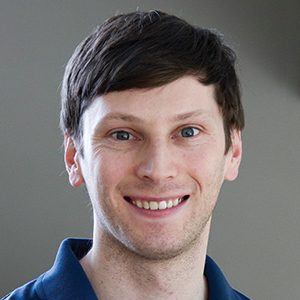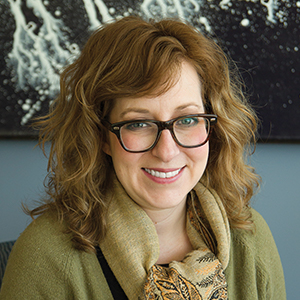Member update: August 2019
Bumpus receives pharmacology award
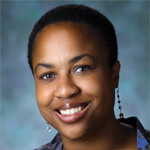 Namandjé Bumpus
Namandjé Bumpus
Johns Hopkins University School of Medicine associate professor Namandjé Bumpus has received the 2019 John J. Abel Award in Pharmacology from the American Society for Pharmacology and Experi–mental Therapeutics.
Named in honor of the ASPET’s founder, the award was established in 1946 to support fundamental research in pharmacology and experimental therapeutics by young investigators.
Bumpus is being honored “for her research on the impact of drug metabolites of HIV drugs on their pharmacology and toxicology and on the effect of genetic variation in drug metabolism on anti-HIV drug disposition,” the society stated.
Bumpus is an associate professor of medicine and pharmacology as well as the associate dean for basic research at Hopkins.
She received a $5,000 honorarium and gave keynote lecture at the ASPET annual meeting at Experimental Biology 2019 in April titled “Drug metabolism, pharmacogenomics and the quest to personalize HIV treatment and prevention.”
Davis named UMass chair
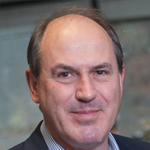 Roger J. Davis
Roger J. Davis
Roger J. Davis has been appointed chair of the Program in Molecular Medicine at the University of Massachusetts Medical School.
Davis came to the UMass Medical School as a Damon Runyon–Walter Winchell Fund fellow in 1984 and was appointed assistant professor in the department of biochemistry and molecular biology in 1985.
In 1990, Davis became a founding member of the Program in Molecular Medicine, a group that conducts biomedical research through applying novel techniques and approaches to the study of molecular mechanisms that underlie physiological processes.
An investigator with the Howard Hughes Medical Institute, Davis studies the role of the c-Jun NH2-terminal kinase family of stress-activated MAP kinases.
Davis has received numerous accolades for his work. He was elected to the Royal Society in 2002 and to the National Academy of Sciences in 2018. Thomson Reuters identified him as the most cited scientist in the world for 1995–1996.
DuBois honored for cancer research
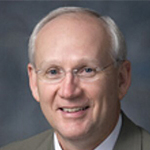 Raymond DuBois
Raymond DuBois
Raymond DuBois has received the American Association for Cancer Research’s Margaret Foti Award.
Established in 2007, the award recognizes leadership and extra- ordinary achievements in the field of cancer research.
DuBois was recognized for his leadership in the early detection, interception and prevention of colorectal cancer. According to an AACR press release, DuBois “discovered the mechanistic function of prostaglandins (PGs) and cyclooxygenase in colon cancer initiation and progression and clarified the role of PGs in the tumor microenvironment, spearheading the consideration of aspirin and other non-steroidal anti-inflammatory mediators for cancer prevention.”
He is dean of the college of medicine at the Medical University of South Carolina, where he serves as professor in the departments of biochemistry, molecular biology and medicine.
DuBois is chairman and president of the AACR Foundation and is a fellow of the AACR Academy. He served as president of the AACR in 2008.
He was recognized formally and presented an award lecture at the AACR’s annual meeting this spring.
Proteomics award named for Costello
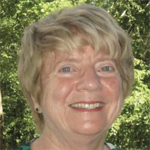 Catherine Costello
Catherine Costello
Catherine Costello has received the inaugural 2019 Lifetime Achievement in Proteomics award from the U.S. Human Proteome Organization, or US-HUPO.
After the presentation in March, the award was renamed the Catherine E. Costello, Ph.D., Award for Lifetime Achievement in Proteomics, the first time an award has been named after a female scientist in the field of proteomics.
Costello is a William Fairfield Warren distinguished professor at Boston University with her primary appointment in the school of medicine. She served as president of the American Society for Mass Spectrometry from 2002 to 2004, president of the international HUPO from 2011 to 2012 and president of the International Mass Spectrometry Foundation from 2014 to 2018.
Costello’s research focuses on understanding the structures and functions of biologically important polymers. She has authored or co-authored more than 375 scientific papers and has received numerous awards for her proteomics research, including the 2009 Thomson Medal from the IMSF, the 2010 Field and Franklin Award from the American Chemical Society and the 2017 Distinguished Contribution Award from the ASMS.
Members elected to the American Academy of Arts and Sciences
Five ASBMB members were among the 200 new inductees to the American Academy of Arts and Sciences this spring.
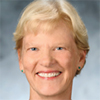 Alison Butler is a distinguished professor in the department of chemistry and biochemistry at the University of California, Santa Barbara. Just last year she won the American Chemical Society’s Alfred Bader Award in bioinorganic chemistry. She previously served as president of the Society for Biological Inorganic Chemistry.
Alison Butler is a distinguished professor in the department of chemistry and biochemistry at the University of California, Santa Barbara. Just last year she won the American Chemical Society’s Alfred Bader Award in bioinorganic chemistry. She previously served as president of the Society for Biological Inorganic Chemistry.
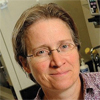 Rachel Green is a distinguished professor at the Johns Hopkins University School of Medicine department of molecular biology and genetics and a Howard Hughes Medical Institute investigator. She was elected to the National Academy of Sciences in 2012 and the National Academy of Medicine in 2017. She is a former member of the ASBMB council.
Rachel Green is a distinguished professor at the Johns Hopkins University School of Medicine department of molecular biology and genetics and a Howard Hughes Medical Institute investigator. She was elected to the National Academy of Sciences in 2012 and the National Academy of Medicine in 2017. She is a former member of the ASBMB council.
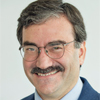 Daniel J. Klionsky is a professor in the college of literature, science and the arts and a research professor at the University of Michigan Life Sciences Institute. He won the Director’s Award for Distinguished Teaching Scholars from the National Science Foundation in 2003 and was named an education mentor by the National Academies in 2006. Two years ago, he received a Distinguished Faculty Achievement Award from the University of Michigan.
Daniel J. Klionsky is a professor in the college of literature, science and the arts and a research professor at the University of Michigan Life Sciences Institute. He won the Director’s Award for Distinguished Teaching Scholars from the National Science Foundation in 2003 and was named an education mentor by the National Academies in 2006. Two years ago, he received a Distinguished Faculty Achievement Award from the University of Michigan.
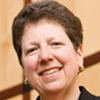 Barbara B. Kahn is the George R. Minot endowed chair and professor of medicine at Harvard Medical School. She is also vice chair for research strategy at the Beth Israel Deaconess Medical Center Department of Medicine. Kahn won the Federation of American Societies for Experimental Biology’s 2019 Excellence in Science Award. She was elected to the National Academy of Medicine in 2005 and the National Academy of Sciences in 2017.
Barbara B. Kahn is the George R. Minot endowed chair and professor of medicine at Harvard Medical School. She is also vice chair for research strategy at the Beth Israel Deaconess Medical Center Department of Medicine. Kahn won the Federation of American Societies for Experimental Biology’s 2019 Excellence in Science Award. She was elected to the National Academy of Medicine in 2005 and the National Academy of Sciences in 2017.
 Cynthia Wolberger is a professor of biophysics and biophysical chemistry at the Johns Hopkins University School of Medicine. She is a fellow of the American Asociation of the Advancement of Science and is the recipient of Protein Society Dorothy Crowfoot Hodgkin Award. Wolberger was elected this year to the National Academy of Sciences.
Cynthia Wolberger is a professor of biophysics and biophysical chemistry at the Johns Hopkins University School of Medicine. She is a fellow of the American Asociation of the Advancement of Science and is the recipient of Protein Society Dorothy Crowfoot Hodgkin Award. Wolberger was elected this year to the National Academy of Sciences.
Genetics society honors Snyder with George W. Beadle Award
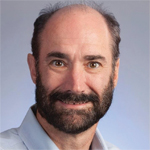 Michael Snyder
Michael Snyder
The Genetics Society of America has honored Michael Snyder of Stanford University with the 2019 George W. Beadle Award.
Snyder was recognized for his pioneering role in the application of omics technologies and big data to personalized medicine. Over the years, he has developed and made freely available several tools that now are considered central for genetics and systems biology research.
Snyder, an associate editor for the American Society for Biochemistry and Molecular Biology journal Molecular & Cellular Proteomics, received the award at the Allied Genetics Conference in April.
Snyder earned his Ph.D. at the California Institute of Technology, did a postdoctoral fellowship at Stanford University, began his faculty and administrative career at Yale University and later became a department chairman at Stanford, where he remains. He is a fellow of the American Association for the Advancement of Science and the American Academy of Arts and Sciences.
The GSA award was established in 1999 in recognition of George W. Beadle, who once served as president of the society and received the 1959 Nobel Prize in physiology or medicine.
Giasson wins UF research award
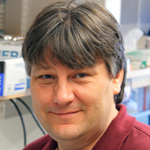 Benoit Giasson
Benoit Giasson
Benoit Giasson has won a University of Florida Research Foundation professorship.
Giasson, a professor in the neuroscience department at UF, will receive a $5,000 annual salary supplement and a one-time $3,000 grant.
Giasson earned his bachelor’s and Ph.D. in biochemistry at McGill University before completing postdoctoral research fellowships with Virginia Lee and John Trojanowski at the University of Pennsylvania. He has been a faculty member at UF since 2012.
The UFRF professorships program recognizes tenured faculty, nominated by their departments, with distinguished research programs and the promise of continued excellence. Up to 34 faculty members are chosen annually.
Wu receives Milstein award for cytokine research
 Hao Wu
Hao Wu
Hao Wu has won the International Cytokine & Interferon Society’s Seymour and Vivian Milstein Award.
Wu is a professor of structural biology at Harvard Medical School and Boston Children’s Hospital. She was selected, the awards committee said in the statement, “in recognition of her unparalleled contributions to the molecular mechanisms of cytokine signaling.”
The Milstein award was established in 1988, two years after interferon first was approved for the treatment of hairy cell leukemia. Wu will receive her award at the society’s meeting in October in Vienna, Austria.
Oldach, Rubin win EXCEL awards
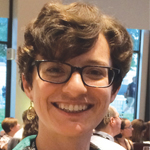 Laurel Oldach
Laurel Oldach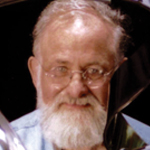 Byron Rubin
Byron Rubin
Laurel Oldach and Byron Rubin have been honored by Association & Media Publishing for work published in ASBMB Today in 2019.
Oldach, a science writer for the American Society for Biochemistry and Molecular Biology, won a gold EXCEL award for her feature article, “Not one more generation: Women in science take on sexual harassment,” published in September. Over the past 18 months, she has written news articles and features for the magazine on a variety of topics, including Parkinson’s disease, antibody patents and proteomics.
Rubin, an adjunct professor in the department of biochemistry and biophysics at the University of Rochester School of Medicine, won a bronze award for his essay, “Up the creek without a sequence?” which closed out the series “When science meets sickness” in December. This was Rubin’s first essay for ASBMB Today. He also creates metal sculptures of biological macromolecules for museums, universities and pharmaceutical companies.
Association & Media Publishing is a membership organization serving the needs of association, nonprofit and alumni publishing teams. The awards were presented in June.
Members elected to the National Academy of Sciences
Seven ASBMB members have been elected to the National Academy of Sciences. They were among 100 new members and 25 foreign associates recognized for their research.
 Squire J. Booker is a professor at the Pennsylvania State University and a Howard Hughes Medical Institute investigator. In 2017, he was elected to the American Academy of Arts and Sciences. He has served as chair of the ASBMB Minority Affairs Committee and is a member of the ASBMB council.
Squire J. Booker is a professor at the Pennsylvania State University and a Howard Hughes Medical Institute investigator. In 2017, he was elected to the American Academy of Arts and Sciences. He has served as chair of the ASBMB Minority Affairs Committee and is a member of the ASBMB council.
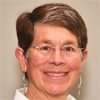 Lila M. Gierasch is a distinguished professor at the University of Massachusetts, Amherst. Last year she won the Ralph F. Hirschmann Award in peptide chemistry from the American Chemical Society. She is editor-in-chief of the Journal of Biological Chemistry, an ASBMB publication.
Lila M. Gierasch is a distinguished professor at the University of Massachusetts, Amherst. Last year she won the Ralph F. Hirschmann Award in peptide chemistry from the American Chemical Society. She is editor-in-chief of the Journal of Biological Chemistry, an ASBMB publication.
 Aviv Regev is a professor at MIT, a core member and chair of the faculty at the Broad Institute of MIT and Harvard and a Howard Hughes Medical Institute investigator. She was an HHMI early-career scientist from 2009 to 2014. In 2014, she won the ASBMB’s Earl and Thressa Stadtman Scholar Award.
Aviv Regev is a professor at MIT, a core member and chair of the faculty at the Broad Institute of MIT and Harvard and a Howard Hughes Medical Institute investigator. She was an HHMI early-career scientist from 2009 to 2014. In 2014, she won the ASBMB’s Earl and Thressa Stadtman Scholar Award.
 Martine F. Roussel is a faculty member at St. Jude Children’s Research Hospital and the University of Tennessee at Memphis. She heads up the cancer biology program of the SJCRH Comprehensive Cancer Center. Roussel was elected to the American Academy of Arts and Sciences in 2011 and serves on the National Cancer Institute’s board of scientific advisors.
Martine F. Roussel is a faculty member at St. Jude Children’s Research Hospital and the University of Tennessee at Memphis. She heads up the cancer biology program of the SJCRH Comprehensive Cancer Center. Roussel was elected to the American Academy of Arts and Sciences in 2011 and serves on the National Cancer Institute’s board of scientific advisors.
 William Weis is a professor and chair of the structural biology department at the Stanford University School of Medicine. He has served as chair of photon science at SLAC National Accelerator Laboratory and as director of the graduate program in biophysics.
William Weis is a professor and chair of the structural biology department at the Stanford University School of Medicine. He has served as chair of photon science at SLAC National Accelerator Laboratory and as director of the graduate program in biophysics.
 Cynthia Wolberger is a professor of biophysics and biophysical chemistry at the Johns Hopkins University School of Medicine. She is a fellow of the American Asociation of the Advancement of Science and received the Protein Society Dorothy Crowfoot Hodgkin Award. She was elected this year to the American Academy of Arts and Sciences.
Cynthia Wolberger is a professor of biophysics and biophysical chemistry at the Johns Hopkins University School of Medicine. She is a fellow of the American Asociation of the Advancement of Science and received the Protein Society Dorothy Crowfoot Hodgkin Award. She was elected this year to the American Academy of Arts and Sciences.
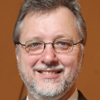 Rudolf Zechner (foreign associate) is a professor at the Institute of Molecular Biosciences at the University of Graz in Austria. He is director of BioTechMed-Graz and a past winner of Austria’s top science award, the Wittgenstein Prize Those elected this year bring the total number of active NAS members to 2,347 and the total number of foreign associates to 487. The NAS reports that 40% of the newly elected members are women — the most ever elected in any one year to date.
Rudolf Zechner (foreign associate) is a professor at the Institute of Molecular Biosciences at the University of Graz in Austria. He is director of BioTechMed-Graz and a past winner of Austria’s top science award, the Wittgenstein Prize Those elected this year bring the total number of active NAS members to 2,347 and the total number of foreign associates to 487. The NAS reports that 40% of the newly elected members are women — the most ever elected in any one year to date.
In memoriam: Boyd O’Dell
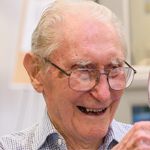 Boyd O’DellBoyd O’Dell, one of the first scientists to reveal the important roles that folic acid and vitamin B12 play in development, died April 21. He was 102.
Boyd O’DellBoyd O’Dell, one of the first scientists to reveal the important roles that folic acid and vitamin B12 play in development, died April 21. He was 102.
O’Dell spent about 80 years on the campus of the University of Missouri, and he was a legend there. Indeed, in a 2016 UM article about his 100th birthday celebration, a colleague said, “This man walks on water for people.” There’s even a bridge dedicated to him.
O’Dell was born in central Missouri on Oct. 14, 1916. He told writer Stephen Schmidt that the doctor present at his birth arrived on horse and buggy. Perhaps fatigued by the 10-mile ride or the delivery itself, the doctor wrote the wrong date on baby Boyd’s birth certificate. O’Dell’s mother insisted the correct date was Oct. 14, and so it was.
After attending a one-room rural school, O’Dell went to the University of Central Missouri but decided to transfer to UM in 1937 to complete a chemistry degree. He earned master’s and doctoral degrees at MU in agricultural chemistry and during that time worked on isolating folic acid. Upon graduation, O’Dell took a job in Detroit as a research chemist. He was recruited to UM four years later.
As an academic researcher, he worked on trace element deficiencies and was particularly interested in zinc and copper. In the late 1950s, he was involved in the discovery of how phytic acid interferes with the absorption and utilization of zinc. All told, O’Dell had more than 200 articles to his name and even in so-called retirement was continuing to investigate how zinc deficiency harms cell function by blocking the signal for calcium uptake.
To learn more about O’Dell’s post-retirement research, see “Just like Boyd” in the April 2017 issue of ASBMB Today.
In memoriam: Woon Ki Paik
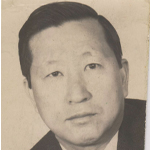 Woon Ki PaikProfessor Woon Ki Paik died Feb. 16 in Evanston, Illinois, of primary bile duct cancer. He was 94.
Woon Ki PaikProfessor Woon Ki Paik died Feb. 16 in Evanston, Illinois, of primary bile duct cancer. He was 94.
Paik was born March 2, 1925, in Naju, Chollanamdo, South Korea. He attended high school in Seoul and served in the Republic of Korea’s army as a lieutenant during the Korean War.
After the war, he immigrated to Canada, where he received his master’s degree from Dalhousie University. He then completed research appointments at the National Cancer Institute, the University of Wisconsin and Ottawa University.
Paik ultimately joined the faculty at Temple University School of Medicine, where he spent 30 years before retiring as a professor emeritus of biochemistry in 1995.
With his wife and co-investigator, Sangduk Kim, Paik conducted significant research on protein methylation, an important area in the field of epigenetics.
He published more than 250 peer-reviewed publications, two books and multiple book chapters.
Late in his career, he returned with his wife to South Korea to help educate the next generation of Korean-born scientists.
Paik is survived by his wife, Sangduk Kim; their three children, Margaret, Dean and David; and six grandchildren.
In memoriam: Geoffrey N. Hendy
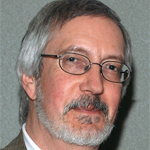 Geoffrey N. HendyFormer McGill University professor Geoffrey N. Hendy died Aug. 9, 2018. He had cancer.
Geoffrey N. HendyFormer McGill University professor Geoffrey N. Hendy died Aug. 9, 2018. He had cancer.
Born in London in 1948, Hendy received his undergraduate degree at the University of Sheffield before obtaining his Ph.D. at the University of London. He completed his postdoctoral training at Harvard University and the Massachusetts Institute of Technology.
In 1985, Hendy joined the calcium laboratory of the division of endocrinology in the department of medicine at McGill University in Montreal.
Hendy remained on the McGill faculty for 34 years, serving as an assistant professor in medicine, associate professor in physiology, and professor in medicine and human genetics.
His research primarily focused on the genetic causes of mineral metabolism disorders. A highly cited author, Hendy published 248 peer-reviewed papers and numerous book chapters.
Hendy was also a mentor to numerous undergraduate and graduate students.
In memoriam: Elizabeth E. Howell
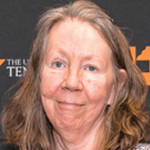 Elizabeth E. HowellElizabeth “Liz” E. Howell, the Charles P. Postelle distinguished professor in the biochemistry department of the University of Tennessee at Knoxville, died April 9.
Elizabeth E. HowellElizabeth “Liz” E. Howell, the Charles P. Postelle distinguished professor in the biochemistry department of the University of Tennessee at Knoxville, died April 9.
Howell was internationally recognized for her studies of the biophysics and mechanisms of enzymes in the dihydrofolate reductase family, which includes important anti-cancer targets. She began her faculty career at UT in 1988. She was the first woman hired in the then-25-year-old department. She spent her entire career at UT and is remembered by colleagues for her commitment to helping others launch careers as independent researchers.
Howell also was an artist, working primarily with ceramics and clay. In 2009, the National Science Foundation selected one of her computational models for display at its headquarters. That work previously had been featured on the cover of the Journal of Computationally Aided Molecular Design.
Howell was elected as a fellow of the American Association for the Advancement of Science in 2014.
Enjoy reading ASBMB Today?
Become a member to receive the print edition monthly and the digital edition weekly.
Learn moreGet the latest from ASBMB Today
Enter your email address, and we’ll send you a weekly email with recent articles, interviews and more.
Latest in People
People highlights or most popular articles
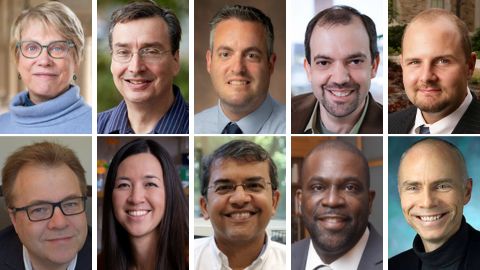
2024 voter guide
Learn about the candidates running for ASBMB Council, Nominating Committee, Publications Committee and treasurer.
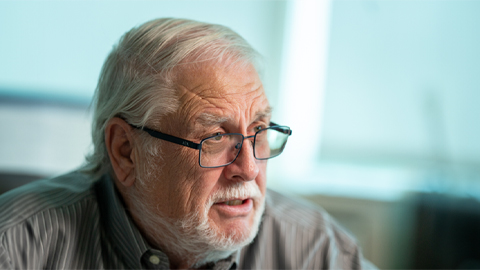
Charles O. Rock (1949 – 2023)
Colleagues and trainees remember a world expert in membrane lipid homeostasis.
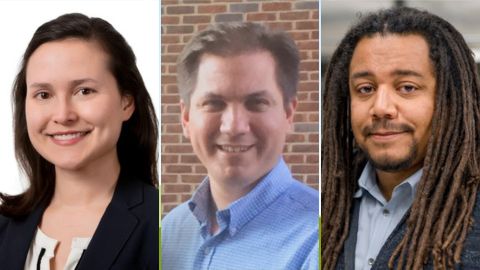
Honors for Clemons, Hatzios and Wiemer
Awards, honors, milestones and more. Find out what's happening in the lives of ASBMB members.
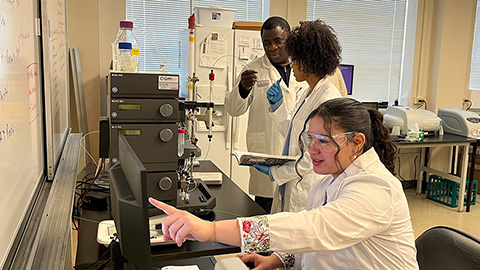
Touching the future from the bench
Scholar, scientist, teacher and mentor Odutayo Odunuga discusses the important roles of the institutional PI, his journey and his research.
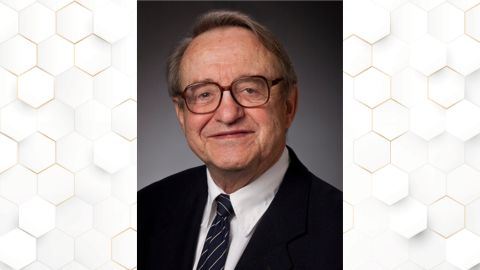
In memoriam: Darwin Prockop
He held leadership positions at multiple institutions and was known for his contributions to adult stem cell biology and cellular biology.

A look into medical writing
Our careers columnist spoke with Ashlea A. Morgan at Chameleon Communications International to get a sense of one type of work a medical writer can do.

